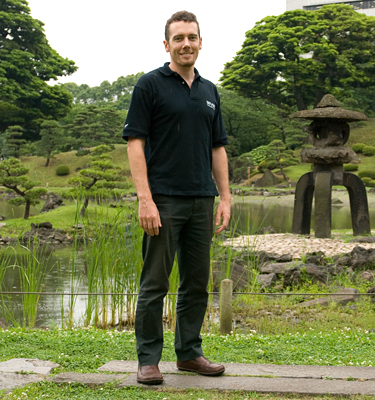
Posted: Mon Jul 12 2010
Shannon Walker, New Zealand Tourism Board employee
What’s with the ‘100% PURE’ you have written on your shirt?
SW: It’s not referring to me. [Laughs] It's referring to New Zealand.
Is that where you’re from?
SW: Exactly, I’m a Kiwi – New Zealanders are often referred to as Kiwis. I’ve been in Japan for about eight years and work for the New Zealand Tourism Board. As a New Zealander, it’s really great to be able to promote my own country here.
What brought you to Japan eight years ago?
SW: Back when I was a high school student, I came to Tokyo as an exchange student, on a one-year home stay. I wore a gakuran (a type of Japanese school uniform for boys with a stand-up collar) and went to a pretty strict boys’ school – it was tough. We were disciplined with such zeal that I sometimes thought I’d joined the military. [Laughs] Plus, to make matters worse, I was the only foreign student in the school. Still, after returning to New Zealand, I went on to university and, after graduating, came back to Japan.
Why come back?
SW: I studied Japanese at university, but I wasn’t satisfied with my level of fluency. I’m still learning even now. [Laughs] I came back because I wanted to learn more Japanese and well, I guess I just kind of like it here. From a New Zealander’s perspective it’s a pretty extraordinary place.
What’s the biggest difference?
SW: In most respects things aren’t so different – people are people. However, I’ve been here for nearly eight years and I still can’t really say that I know Tokyo all that well. I think I never will. Every day brings something new – something exciting or astonishing. However many years pass, I think there’ll always be something left to discover.
Have you discovered anything lately?
SW: Having lived in places such as Kichijoji, Ogikubo, Shibuya and Meguro, I’ve become relatively familiar with Western Tokyo; however, I’m not very familiar with Northern Tokyo – it’s like a different world up there. Recently, I’ve been trying to make it up there more often. Just the other day, I was walking from Ueno to Nezu when I came across a Kiwi bar, called NZ Bar. To my surprise, I found a pretty authentic New Zealand atmosphere – in a place where I wasn’t expecting it. The staff there are Japanese, but they knew their stuff when it came to New Zealand wines. New Zealand has a number of wineries, and you’ll find that almost all of them focus on quality rather than quantity.
Having lived in Tokyo for a while now, do you ever miss the tranquillity of New Zealand?
SW: Life within Tokyo is fascinating. When compared to other metropolitan cities, Tokyo may not seem particularly clean; plus it’s full of ugly buildings and structures, and the roads here appear too narrow. However, these are precisely the kind of things that make it so interesting. There’s telephone poles and wires everywhere, and just about everything here is man made, but mixed in with all the chaos are serene spaces like shrines, for example – places that offer you a chance to momentarily step out of the concrete jungle and into a completely different atmosphere. Plus, some of them may be quite small, but there are plenty of really quite green parks here in Tokyo.
Tell us something about New Zealand.
SW: New Zealand is full of beautiful scenery; however, the scenery there isn’t just something to be looked, it can also be experienced. New Zealanders absolutely love activities that get the heart racing. Bungee jumping, for example, was developed into a commercial sport by a New Zealander. The idea behind bungee jumping is said to have come from an island near Papua New Guinea, where people used a similar practice as a test of courage and passage into manhood. Supposedly, a New Zealander who saw this thought it would make a great activity and began developing the idea.
As soon as you get out of the airport you’ll notice the fresh air. And the food in New Zealand is great. Originally, New Zealand cuisine was a lot like that of British cuisine. People mainly ate things like meat pie; however, since then New Zealand has been influenced by different cultures from all over the world. Positioned on the edge of the world, New Zealand looks out across the globe. Plus New Zealanders love to travel, people go off to study in places such as France, the UK and various other places, before coming back and sharing what they’ve learnt – nowadays you can eat foods from all over the world in New Zealand. Blessed with an abundance of fresh ingredients such as lobster, shrimp and herbs, New Zealanders have learnt how to make some fantastic cuisine.
More from Shannon:
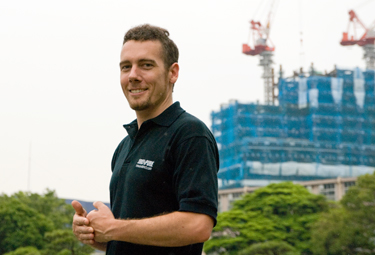
‘I was born in a small surf town with a population of about one thousand people. Because it's located next to the shore, the roads there aren’t properly maintained; the post office is only open two days a week and you have to collect your own mail. Coming to Japan from such an extremely different place is fascinating – I love the contrast.’
‘My wife’s Japanese. We’ve had our share of difficulties living together, but we’ve always overcome our differences [Laughs]. People say that Kiwis make the best husbands. Supposedly, we help out around the home a lot!’
‘I love to be active and often take part in adventure racing in Japan. Life in the city is great, but one of the best things about living here in Tokyo is that nature is so accessible. For example, come the weekend, it’s easy to jump in a car or catch a train and head out to the ocean or a BBQ.’
Tags:
Tweets
- About Us |
- Work for Time Out |
- Send us info |
- Advertising |
- Mobile edition |
- Terms & Conditions |
- Privacy policy |
- Contact Us
Copyright © 2014 Time Out Tokyo











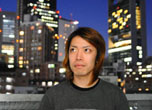
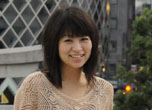
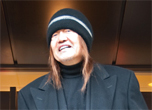
Add your comment